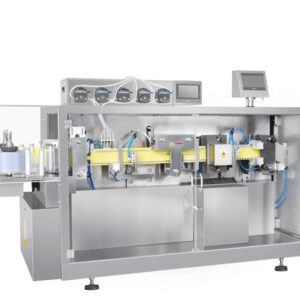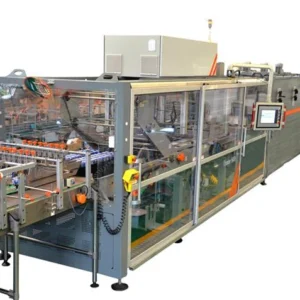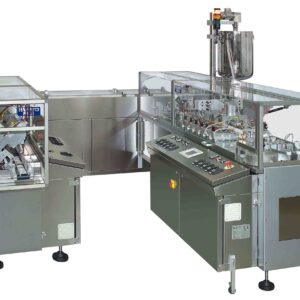Description
| Parameter | Specification |
|---|---|
| Production Capacity | Up to 1000 units per minute (adjustable) |
| Packaging Formats | Blister packs, strip packs, bottle filling, etc. |
| Tablet and Capsule Compatibility | Range of sizes from 5mm to 25mm diameter |
| Packaging Material Compatibility | PVC, PVDC, ALU-ALU, ALU-PVC, etc. |
| Filling Accuracy | ± 1% |
| Blister Dimensions (Adjustable) | Length: 50mm – 200mm, Width: 30mm – 150mm |
| Strip Pack Dimensions (Adjustable) | Length: 50mm – 200mm, Width: 30mm – 120mm |
| Bottle Filling Capacity | 50ml to 1000ml (adjustable) |
| Line Control System | PLC (Programmable Logic Controller) with HMI |
| Power Supply | 3 Phase, 380V, 50Hz |
| Air Pressure | 0.6 MPa (6 bar) |
| Total Power Consumption | 10 kW (approx.) |
| Overall Dimensions (L x W x H) | 6000mm x 1500mm x 2000mm |
| Weight | 2500 kg (approx.) |
In terms of pharmaceutical packaging, high technological advancements are enclosed in automatic systems used for tablet and capsule packing. The design of these lines is aimed at boosting the process of packaging by ensuring that it is accurate, efficient, and adheres to the set standards of regulatory authority. They have different modules and components working together to handle product feeding and final packaging among other aspects.
Processes
Product Feeding: Tablets or capsules are put into a packing line through a hopper or feeder system.
Sorting And Counting: The tablets or capsules are sorted out and counted correctly using advanced sensors and mechanisms.
Packaging Material Handling: Blister packs, bottles, sachets, etc., which are used as packaging materials, are passed along the line for filling at appropriate positions.
Filling: According to a specific dosage, tablets/capsules are accurately filled into the respective packages that hold them.
Sealing: Packaging machines assist with sealing to preserve the integrity of the package while making it impossible to tamper with or open without evidence.
Labeling: Packages get labels on them containing such information as product name, dose size, and expiration date.
Quality Control: Only quality products will be released on the market as automated inspection systems scrutinize for shortcomings in items produced in this way.
Packaging & Cartoning: Finished packages should be bunched together, cartoned then ready for distribution.
Applications
Automatic tablet and capsule packing lines find extensive applications across the pharmaceutical industry including;
Tablets And Capsules: Oral solid dosage forms such as tablets and capsules
Blister Packs: Blister packs for unit-dose medications
Bottling: Tabulation or encapsulation corresponding with bottle filling
Sachets: Sachets containing granules/powders/liquids
Multi-Dose Packaging: Medications for multiple doses
Clinical Trials: Medications prepared for clinical trials having precise dosing and labeling
Over-the-Counter (OTC) Products: Different OTC drugs packed for retail distribution
Functions
Automated Feeding: Feeds tablets or capsules through the packaging line at the appropriate rate without the need for human intervention.
Accurate Counting: There are advanced counting mechanisms used to ensure that the dosage is precise.
Flexible Packaging: The machine is capable of handling different packing formats and sizes.
Sealing And Labeling: It can seal and label packages in a way that meets regulatory requirements.
Quality Assurance: Has checks to find out poor quality products so that they are not sold.
High-Speed Operation: High-speed packaging is possible to meet production demands.
Integration Capabilities: Can work with other manufacturing systems providing a smooth operation
Customization Options: Available for specific packaging needs.
Remote Monitoring: Allows remote monitoring and control of the packing process from any place outside this setup
Compliance And Traceability: Provides information on adherence to set regulations during packaging.
Benefits
Increased Efficiency: Higher productivity, reduced labor costs due to automation
Improved Accuracy: Dosage errors are minimized by using precision counting and packaging
Enhanced Safety: Product safety and integrity assured by tamper-evident packaging
Cost Savings: Lower waste production, increased efficiency thereby lowering costs incurred.
Regulatory Compliance: Adhering to regulations helps maintain product quality & compliance standards. Speed up product development & launch by simplifying packing processes
Scalability: Production capacity can easily be expanded to match a growing demand for products of this kind
FAQs
How do automatic tablet and capsule packing lines ensure accuracy in dosage?
Tablets or capsules are filled into packaging materials after being counted using advanced mechanisms which count precisely keeping in mind whatever has been pre-determined by sensors integrated into these lines.
Do automatic packing lines cater to different sizes and shapes of tablets and capsules?
Adjustable settings (including customization options) allow various sizes and shapes of tablets/capsules to be accommodated in automatic packing lines.
What measures are taken during the sealing process to ensure the individual safety of products?
To avoid this challenge, tamper-evident seals are provided in automatic packing lines so that there will be no danger caused by opening such caps mistakenly
Are these machines compliant with regulation standards?
Pharmaceutical administrations such as the U.S. FDA (Food and Drug Administration) and Good Manufacturing Practices have certified automatic packing lines.
How does it help in saving costs for pharmaceutical firms?
Saving costs means that automatic packing lines contribute to cutting expenses incurred in manufacturing a drug since there is increased efficiency, and no waste is produced when packaging and labor cost is reduced.
Can these machines be connected with other production units?
These systems can be easily integrated within other portions of the company’s operating system such as upstream and downstream manufacturing processes.
What maintenance requirements are needed for automatic packing lines?
To keep them running well all the time, these machines need regular checkups some of which also involve calibration
Can small-scale pharmaceutical manufacturers embrace this technology?
Different sizes and configurations make it possible for automatic packing lines to fit into both large-scale and small-scale pharmaceutical companies
How do they handle product serialization and traceability?
To facilitate product traceability not forgetting regulatory compliance attached to each unique identification code on products, ergo labeling modules have been added to automatic packing lines.
What are the main considerations when selecting an Automatic Tablet & Capsule Packing Line?
These include production capacity, flexibility, regulatory compliance, customization ability, and integration capabilities.





Reviews
There are no reviews yet.